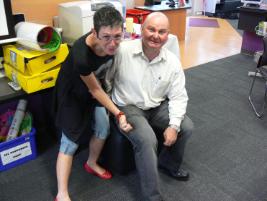Cairns teachers switch on to allergy management
Published on 31 January, 2013
It's not often that paramedics are on the receiving end of a needle but CQUniversity's Paramedic Lecturer Paul Oliveri was happy to play patient for 40 teachers from St Gerard Majella Primary School in Cairns...
Paul recently conducted an anaphylaxis management and training session for teachers who were keen to learn more about severe allergic reactions and how to manage them within the school environment.

St Gerard Majella School Counsellor Tauba Naftal takes part in a practice exercise with CQUniversity Paramedic Lecturer Paul Oliveri. According to Allergy & Anaphylaxis Australia, one in 10 babies will be born with some form of allergic reaction which may become life-threatening in the future.
"Anaphylaxis is the most severe form of allergic reaction and is potentially life threatening. It must be treated as a medical emergency requiring immediate treatment and urgent medical attention," Paul said.
Common triggers for allergy in general can be food containing nuts, dairy, eggs or shell fish, as well as bites and stings.
Paul said anaphylaxis is becoming so common that even small schools are now seeing multiple children within the school having to carry adrenalin auto injectors for teachers to administer in the event of a reaction.
"Some of these children have allergies that are so severe that they only have to smell the allergen to have a life threatening anaphylactic reaction which requires treatment with the Ana pen or Epipens (adrenaline autoinjectors)," he said.
"As you can imagine, this is a scary type of procedure for teachers to have to undertake, but it may save a child's life."
Paul said the training session was a good opportunity for teachers to learn more about anaphylaxis, the use of adrenaline auto-injectors and how to manage an emergency situation.
"The session went over really well; the teachers had a lot of questions about the storage of the adrenaline auto-injectors and the legalities of giving children this medication when needed," he said.
"We went through management plans for schools and it gave the teachers a little more confidence in knowing how to treat some of the children who really suffer from this condition."
To learn more about anaphylaxis visit http://www.allergyfacts.org.au/
CQUniversity's Paul Oliveri can be contacted on 0407 630 398.

